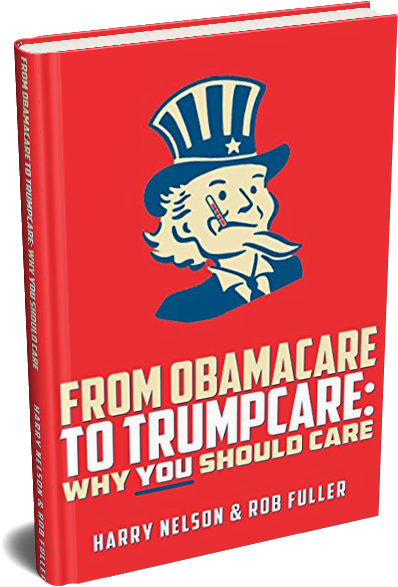Order your copy today!
The misuse of and addiction to opioids—including prescription pain relievers, heroin, and fentanyl—is the worst public health disaster in American history. 750,000 overdose deaths. 6 million Americans living with an opioid use disorder. The Centers for Disease Control and Prevention estimates that the total “economic burden” of prescription opioid misuse alone in the United States is over $78.5 billion a year, including the costs of healthcare, lost productivity, addiction treatment, and criminal justice. Where did we go wrong? Who’s to blame?
More importantly, how do we fix the problem before more of our friends and families become another statistic? The United States of Opioids lays out a roadmap for the way out of the deadliest public health crisis in U.S. history, offering insights into how our health system needs to adapt, as well as practical tools for families, employers, and communities to prevent and intervene in opioid addiction.

RELEASE DATE MARCH 26, 2019
The United States of Opioids:
A Prescription for Liberating a Nation in Pain
The United States of Opioids explains how and why the opioid epidemic became America’s greatest self-inflicted wound, a slow-motion mass casualty event resulting from tragic mistakes, Nelson goes beyond the wanton greed of pharmaceutical manufacturers to focus on the blindness of insurance companies and government among multiple points of system failure.
Nelson details the unfolding story of how prescription drug overdose deaths quadrupled from 1999 through 2010, and how a crackdown on prescribers drove people in pain to black tar heroin and fentanyl. He explains why the surge in deaths from opioid abuse has been underreported and is not far off of a million dead, with over 11 million more Americans living with opioid addictions. Beyond the tragedy for affected families, Nelson argues that the crisis signals not merely health system failure, but a deeper spiritual and social crisis afflicting America.
Nelson explores these deeper root causes that provided fertile ground for the worst public health crisis in our nation’s history and explores the solutions on the table. He offers a guide to what each of us can do for our children, the people we care about and work with, and the good that will come out of re-dedicating ourselves to the common cause of preventing and intervening personally in this crisis. The book is a must-read for anyone interested in the future of this country.
Check out The United States of Opioids on Audible today!
“In The United States of Opioids, Harry Nelson offers a clear and comprehensive picture of how the opioid crisis emerged and the challenges in addressing it. His book is at once accessible to general readers and full of insights for behavioral health veterans. This crisis has, among other things, highlighted serious and long-standing deficiencies in how we as a nation address substance abuse, addiction and recovery. I highly recommend the book as a starting point and framework for thinking seriously about how we develop better means for meeting the needs of people in recovery from addiction, people not yet in recovery, families, communities, and everyone touched by the opioid crisis.”
“Harry has written a powerful book . . . . The United States of Opioids is a call to action and tangible steps that we can all take. Harry delivers insights into the challenges facing our health system—doctors, hospitals, and addiction treatment providers—but also offers steps that we can all take as parents and with everyone else in our lives.”
“The United States of Opioids offers a timely and compelling account of both how we got into the opioid crisis and the way out. Harry Nelson weaves together different pieces of the puzzle, both inside and outside our health system, that have never been put together. A must read.”

From ObamaCare to TrumpCare:
Why You Should Care
On the eve of Donald Trump’s presidency, confusion reigned about American healthcare. Why does our health system cost twice as much as the next most expensive system, yet produce much worse health outcomes? Had the Affordable Care Act improved things or made them worse? What did the future hold for American healthcare? Healthcare thought leaders Harry Nelson and Rob Fuller take on big questions, laying out the essential story of how the U.S. health system evolved and why Americans spend more on healthcare and get less than any other advanced industrialized country in the world. Providing a history of healthcare reform, an analysis of where ObamaCare succeeded and failed, and what the future would bring, Nelson and Fuller shed light on the critical questions Americans will be asking about their healthcare in the coming years: What will become of my health insurance, my healthcare, and my health?
Lorem ipsum dolor sit amet, consectetuer adipiscing elit. Praesent aliquam, justo convallis luctus rutrum, erat nulla fermentum diam, at nonummy quam ante ac quam. Maecenas urna purus, fermentum id, molestie in, commodo porttitor, felis. Nam blandit quam ut lacus.
This is a testimonial. Lorem ipsum dolor sit amet, consectetuer adipiscing elit, sed diam nonummy nibh euismod tincidunt ut laoreet dolore magna aliquam erat volutpat. Ut wisi enim ad minim veniam, quis nostrud exerci tation ullamcorper suscipit lobortis nisl ut aliquip ex ea commodo consequat. Duis autem vel eum iriure dolor in hendrerit in vulputate velit esse molestie.
Quisque ornare risus quis ligula. Phasellus tristique purus a augue condimentum adipiscing. Aenean sagittis. Etiam leo pede, rhoncus venenatis, tristique in, vulputate at, odio. Donec et ipsum et sapien vehicula nonummy. Suspendisse potenti. Fusce varius urna id quam. Sed neque mi, varius eget, tincidunt nec, suscipit id, libero.


